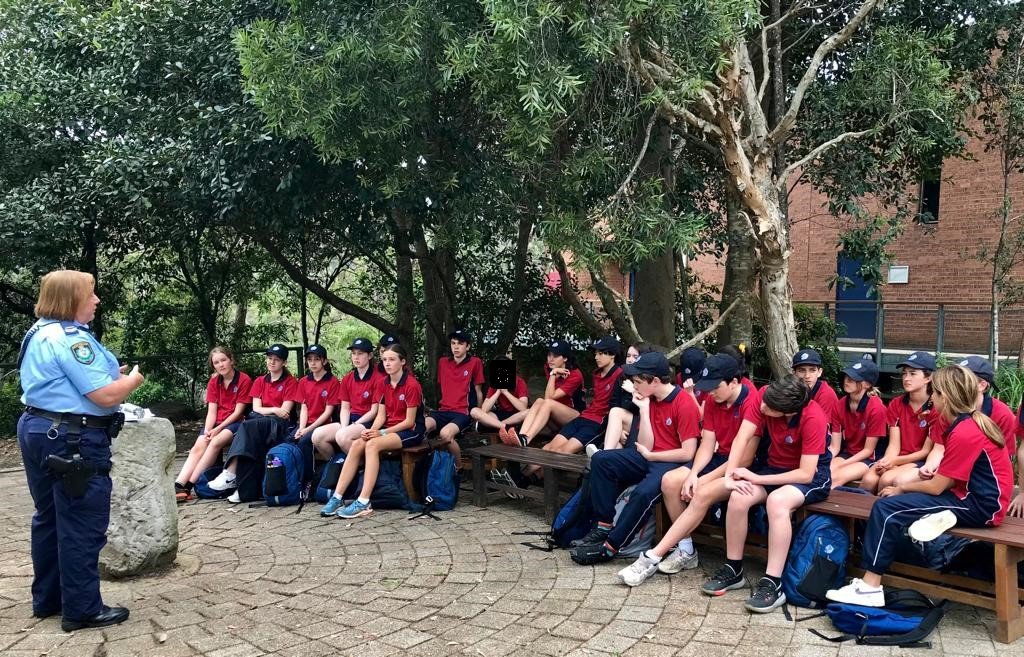
In light of the recent learning from home period, and increased exposure to the online world, as well as more time by themselves navigating friendships and connection through online means, it seemed fitting, and somewhat necessary, to inform students how safest and best to navigate the online and social media world.
I invited Senior Constable Lynda Hart to visit and educate our Year 8 PDHPE co-hort on the pressing and topical issues of cyber safety and safe social media use. In her role as School Liaison Officer, Lynda was a great source of knowledge to have at school. She brought a unique insight and view of the subject matter which was much appreciated by the students who had many questions for her!
Lynda has a thirty-year career in the NSW Police Force and in her current role, educates schools on the north shore of Sydney. Her bottom line was: students must learn and understand how to be safe online. Information is key!
She spoke about the dangers of posting anything on any platform, be it TikTok, Snapchat, Instagram, WhatsApp or the ‘old’ Facebook all social media platforms will have the same dangers: once you post anything (and some young people post very personal and revealing things without much thought) it is in the open realm, it’s not yours anymore. Any post can be screenshot, can be passed on and by that be multiplied within minutes! Everything that has been posted can become evidence in a potential police investigation.
Lynda also stressed the obvious which is never to engage and talk online to someone you don’t know! If students feel harassed they can block a caller or person, they do not want to be contacted by and report them. It is advisable to take a screen shot too of someone who contacts a young person without their request.
Students need to be aware of protective behaviours and strategies. The simplest is to put their social media settings on ‘private’ and to regularly check whether or not all of the ‘friends’ in their contacts are in fact still people they would like to share more personal information with. Lynda suggested to regularly go through one’s friends list as often it includes people one has little to do with any more. As a rule of thumb she said: “If you don’t want your auntie to see what you post it’s best not to post it at all”. However, even among ‘friends’ screen shots and passing on of images does occur!
Students should never take a call from or open a message from an unknown source or click on an attachment in such a message/email.
Students must know that it is considered child abuse if someone takes, shows or sends on inappropriate images (nudes) of anyone or themselves if they’re under 18 or the person in these videos or pics is under 18 years of age. It is considered child pornography!
An issue that often occurs is that of ‘sextortion’ where image based abuse happens in the form that often former girl or boyfriends will threaten to send pics of a very private nature on to others if that person doesn’t do certain things. Sending nudes without consent is a crime.
In our very connected online world, it is increasingly easy for predators to find out where someone lives, where someone is at a given moment in time and to locate a person that may think he/she is in a safe place. Lynda encouraged students to check their phones and switch off the geo locator to avoid that scenario.
Lynda spoke about how digital reputation is gold and needs to be protected as future employers will often look up a prospective applicant online before they ever will see them for a face-to-face interview. Students should aim for a clean digital footprint and also change passwords or use different passwords for different sites they sign up to be safer for being hacked. She also stressed the point to blank out one’s laptop camera (with a band aid) as some sites will only state in their T&Cs that they may access the webcam and film when one is unaware of this happening!
When unkind behaviour happens online, it’s best to ignore it, block the person, never reply and report it. No reaction is often the best reaction. Screen shots of messages can be send to that platform to make a complaint or engage with the below named sources.
Students can make complaints about being bullied, harassed and intimidated online. Good sources to turn to and to report unsafe, unkind or dangerous online behaviour or illegal use of one’s pics are the following agencies:
A great site with a lot of information how to report any cyber abuse: eSafety Commissioner: https://www.esafety.gov.au/young-people/cyberbullying
The police themselves have great information and support for any issue to do with cyber safety:
Kids Helpline, Headspace and Crime Stoppers are further places that also can take the matter of online issues further:
https://kidshelpline.com.au phone: 1800 55 1800
Great sites for parents with questions include:
http://www.safety.gov.au/parents
Jonas Stoebe
PDHPE Teacher




